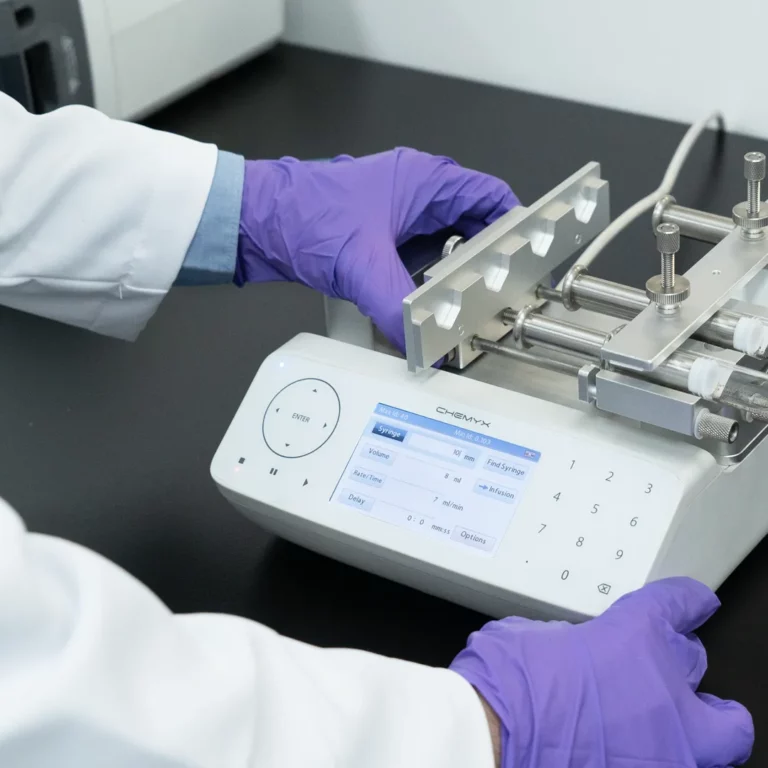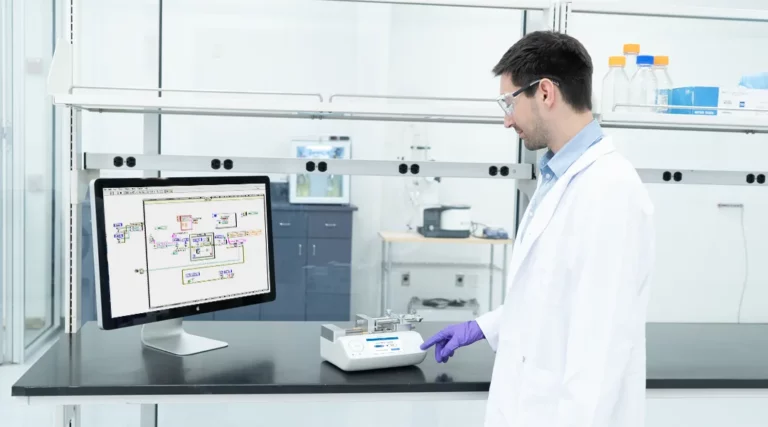In scientific research and industrial settings, the ability to deliver fluids for with precision and accuracy is not just a preference—it’s a necessity. The integrity of an experiment, the ability to reproduce data, and the validity of the results all hinge on exact fluid dosing. For demanding fields like microfluidics, pharmaceutical development, and analytical chemistry, precision syringe pumps are the essential tool for achieving this critical level of control. These devices ensure that every microliter of fluid is dispensed exactly as intended, time after time. As a leading provider of advanced fluid handling solutions, Chemyx offers a range of syringe pumps known for their exceptional precision, reliability, and reproducibility. Finding the best precision syringe pumps means identifying a system that guarantees your experimental outcomes are never compromised by inconsistent fluid delivery.
For a deeper dive, check out this Scientist Guide: Best Syringe Pumps for Research Labs.
Topics covered:
- What Defines a High-Precision Syringe Pump?
- How to Select the Best Precision Syringe Pump for Your Application
- A Comparative Look at Top Precision Syringe Pumps
- System-Wide Factors for Achieving Ultimate Accuracy
- Investing in Accuracy for Dependable Research
What Defines a High-Precision Syringe Pump?
While sometimes confused with medical infusion pumps, laboratory syringe pumps are engineered for a much higher degree of precision, a wider range of flow rates, and broader chemical compatibility to ensure experimental reproducibility. The components, materials, and overall construction of a pump are critical for achieving optimal performance, especially in specialized laboratory applications [1]. Several key performance metrics distinguish a high-precision pump from a standard model.
Unwavering Accuracy and Reproducibility
Accuracy refers to how close the dispensed volume is to the target volume, while reproducibility (or precision) measures the consistency of these results over multiple operations. High-quality pumps, such as many of the models offered by Chemyx, deliver an accuracy of ±0.35% or better. This ensures that your results are not only correct but also repeatable. Furthermore, a smooth, pulseless flow is crucial for sensitive techniques like mass spectrometry and chromatography, where even minor fluctuations in flow can create noise and compromise data quality. When you are Evaluating Top Precision Syringe Pumps for Laboratory Accuracy, these factors are paramount.
Versatile Flow Rate and Pressure Capabilities
Different applications require vastly different flow rates. A precision pump must offer a wide operating range, capable of delivering picoliters per minute for microfluidic experiments or hundreds of milliliters per minute for high-throughput processes. Dispensing viscous fluids or pushing liquids through restrictive tubing also generates back pressure, requiring a pump with enough linear force to maintain a steady flow. While many pumps are suitable for general use, others are designed for specific needs like microfluidics that demand highly stable, low-flow performance [2]. Specialized high-pressure units are available for tasks involving thick liquids or small-bore tubing where significant force is needed.
Advanced Control and Programmability
Modern syringe pumps have moved beyond simple “infuse/withdraw” functions. They now feature advanced control interfaces like USB, RS232, and TTL, allowing for seamless integration with computers and other laboratory instruments. This connectivity is vital for automating complex workflows. The ability to create multi-step programs (e.g., ramping, stepping, or oscillatory flows) minimizes manual intervention, reduces the chance of human error, and significantly enhances the reproducibility of complex experiments.

How to Select the Best Precision Syringe Pump for Your Application
The “best” pump is ultimately the one that perfectly aligns with the specific demands of your experiment. Selecting the right model requires a clear understanding of your application’s requirements for flow rate, pressure, and control.
For Microfluidics, Nanotechnology, and Biosciences
These fields often involve manipulating incredibly small fluid volumes where stability is key. Applications like lab-on-a-chip devices, single-cell analysis, stereotaxic injections for neuroscience, and flow cytometry require exceptionally stable, low, and pulseless flow rates. Dual-channel pumps are often ideal for these scenarios, allowing for the precise and simultaneous delivery of two different fluids. Understanding the diverse Syringe Pump Applications In Bioscience & Biochemistry can help guide your selection.
For Pharmaceutical R&D and Chemical Synthesis
In drug formulation and chemical synthesis, accuracy, chemical resistance, and programmability are critical. Researchers need to create precise chemical gradients, perform automated titrations, or develop complex drug delivery systems. Dual-independent channel pumps, such as the OEM Fusion 4000X Syringe Pump, are essential for advanced applications like microfluidic mixing and the formulation of lipid nanoparticles, where precise timing and prevention of cross-contamination are paramount.
For High-Pressure and Industrial Applications
Some applications, like core flooding in geological research or certain material science experiments, involve pushing highly viscous fluids or working against significant back pressures. These tasks require pumps that can generate substantial linear force to maintain a consistent flow rate. It is also important to pair these pumps with robust syringes, often made of stainless steel, that can withstand the high pressures involved. Exploring high-force models designed for these demanding environments is recommended, and you can view a wide range of options in our catalog of All Syringe Pumps.

A Comparative Look at Top Precision Syringe Pumps
To help users identify the right fit, here is a comparison of leading Chemyx models, each engineered for specific laboratory needs.
Chemyx Fusion Series: The Benchmark for Precision and Versatility
-
Fusion 100X: An excellent choice for precise, dual-channel dosing in applications like microfluidics and neuro-drug delivery, where simplicity and accuracy are key.
-
Fusion 200X: Builds on the 100X by adding programmable multi-step modes, making it ideal for automating complex, unattended workflows.
-
Fusion 4000X: Features dual-independent channels, providing the ultimate flexibility for sophisticated mixing protocols and gradient formation.
-
Fusion 6000X: A high-force option designed for scenarios requiring higher pressure, such as working with viscous fluids or high-resistance systems, while maintaining precise flow control.
| Model | Key Features | Flow Rate Range | Syringe Capacity | Accuracy |
|---|---|---|---|---|
| Fusion 100X | Dual-channel, precise dosing | 0.0001 µL/min to 157 mL/min | 0.5µL to 60 mL | ± < 0.35% |
| Fusion 200X | Dual-channel, programmable | 0.0001 µL/min to 84.7 mL/min | 0.5µL to 60 mL | ± < 0.35% |
| Fusion 4000X | Dual-independent channels | 0.0001 µL/min to 170.5 mL/min | 0.5µL to 100 mL | ± < 0.35% |
| Fusion 6000X | High-pressure, high force | 0.0001 mL/min to 408 mL/min | 0.5µL to 300 mL | ± < 0.35% |
Just as different pump models are designed to fit specific clinical or laboratory needs, selecting the right model from a product family ensures you get the features you need without paying for those you don’t [3].
System-Wide Factors for Achieving Ultimate Accuracy
The pump is the heart of a fluid delivery system, but achieving ultimate accuracy depends on the interplay between the pump, the syringe, and the physical setup. With thousands of options on the market, selecting the right combination is key [4].
The Critical Role of Syringe Selection
The choice of syringe directly impacts precision and accuracy.
-
Volume and Size: For optimal accuracy, the total volume you plan to dispense should represent a significant portion of the syringe’s total capacity. Using a large syringe to dispense a tiny volume can lead to inaccuracies.
-
Material: The syringe material—whether glass, plastic, or stainless steel—must be chemically compatible with the fluid to prevent leaching, swelling, or degradation that could affect results.
Different pumps also have varying levels of compatibility with different syringe types and sizes, making this a critical factor in your selection process [5].
Set Up Configuration and Calibration
The physical setup, including the length and diameter of tubing and the type of connectors used, can introduce variability, especially at very low flow rates. Factors like tubing expansion or the presence of air bubbles can compromise flow stability. Finally, regular calibration is not optional—it is essential for maintaining data reliability. Calibration checks ensure the pump is performing to specification and can compensate for any mechanical drift that may occur over time.
Conclusion: Invest in Accuracy for Dependable Research
Selecting the best precision syringe pump requires a careful evaluation of performance metrics like accuracy, flow rate, and pressure against your specific application’s needs. True precision is achieved not just by the pump alone but by considering the entire fluidic system, including the syringe, tubing, and setup configuration.
Chemyx stands as a reliable partner in this endeavor, offering a comprehensive range of high-precision syringe pumps engineered for scientific discovery and industrial innovation. We encourage you to explore the full range of programmable precision syringe pumps from Chemyx Inc. to find a system built for your success.
Ready to achieve ultimate accuracy in your lab? Browse our available high-precision syringe pumps or contact the Chemyx Customer Care team at info@chemyx.com to find the perfect solution for your research.


